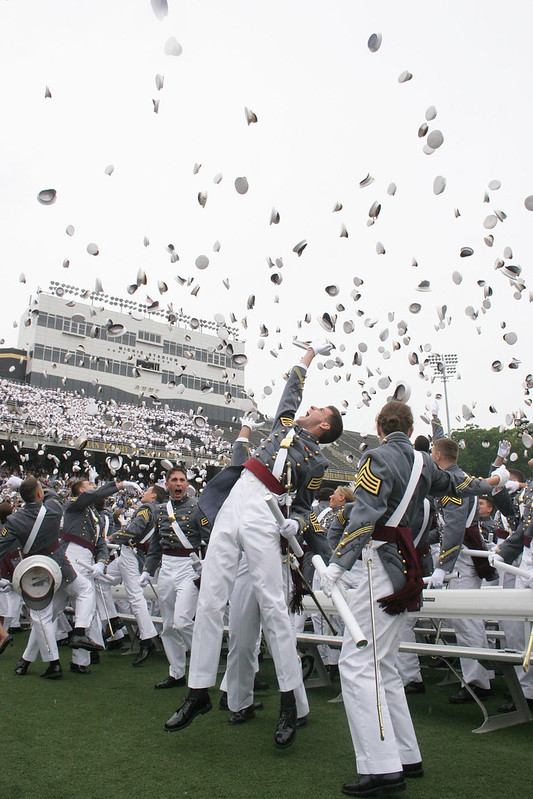
Our nation’s oldest and most storied service academy, West Point (The United States Military Academy), initially told its corps of cadets to stay at home at the end of the spring break in March, in view of the risks and dangers posed by the spreading COVID-19.
This order included its nearly 1,000 soon-to-be commissioned cadets of the Class of 2020, the largest class in the academy’s 144-year history.
The Naval Academy, Annapolis, did likewise and will hold a virtual graduation instead, a difficult decision but necessary “to safeguard the health and welfare of the entire Naval Academy family and local community,” according to Vice Adm. Sean Buck, the academy’s superintendent.
Thus, thousands of cadets and midshipmen scattered to all 50 states and territories to safely ride out the pandemic while officials pondered about how to safely commission the new graduates.
But then, Trump, who adores pomp and circumstance – especially of a military nature — stepped in. Since this was the year he would be delivering the commencement address at prestigious West Point, with all the braggadocio only he can bring to such performances, there was no way, come hell or high water or pandemic or risk to the cadets, Trump would sacrifice such a golden opportunity.
So, on April 17, “the day before Mr. Pence was to speak at the Air Force ceremony in Colorado, Mr. Trump, never one to be upstaged, abruptly announced that he would, in fact, be speaking at West Point.”
Dutifully, the generals are now preparing plans to return the cadets to West Point by car, bus, train and plane, flying into four New York and New Jersey airports, traveling through presently heavily coronavirus-affected areas to arrive at their West Point campus located in a state that is presently at the center of the pandemic.
Cadets would be coming back in late May for the June 13 graduation and, once on campus, would undergo detailed COVID screening, testing, up to three weeks of quarantine, and “integration.”
This is not the first time a West Point class graduates under extraordinary circumstances.
A mere six months after Pearl Harbor, the West Point Class of 1942, the first West Point class to graduate into World War II, held its graduation ceremony in May 1942. Afterwards, the graduates were “ordered immediately to their regiments…”
Although the nation was at war, there was no lack of pomp and ceremony during the graduation of the Class of 1942. How could it have been otherwise when the commencement speaker was none other than General George C. Marshall, one of the most respected and decorated military leaders in American history.
As the reader can see and hear in the rare video below, there was no lack of enthusiasm and no lack of sincere respect for that graduation speaker.
And there was no trace of self-promotion (or self-commiseration), no spouting of politics and no pushing of a political agenda by the General.
Senator Tammy Duckworth, Iraq war combat Army helicopter pilot and Purple Heart recipient has said “Trump’s reckless decision to gather 1,000 Cadets at West Point for a speech puts our future military leaders at increased risk — all to stroke his own ego.”
Retired Lt. Gen. Mark Hertling who served for 37 years in the Army, including three years in combat, and a West Point graduate says:
Under normal circumstances, having a key member of the administration — especially the President — at any graduation contributes to the sense of pride and accomplishment. But the “reward,” which appears heavily weighted to advantage the political desires of the President versus the safety of the cadets — doesn’t overcome the associated resource and personnel risks. In other words, the juice is not worth the squeeze.
A brief historical note:
It would be an interesting project to thoroughly research how war, pandemics, and other disasters have impacted the academic schedules in general and graduations at our military service academies, in particular at West Point.
Here are two instances:
In 1861, early during the Civil War, cadets at West Point were getting antsy about going into active service and petitioned the Secretary of War to graduate their class early. “The Secretary, Simon Cameron, responded favorably, and on May 6, 1861, without benefit of either graduation ceremonies or the traditional furlough, the first class went off to war…”
Encouraged by this success, the new first class also petitioned Cameron and “on June 24, a year early, the cadets were examined, graduated, and ordered to Washington. They received their commissions in General Scott’s office with President Abraham Lincoln present for the ceremony…”
Almost 60 years later, the 1918-1919 Spanish Flu pandemic did not spare West Point.
While the West Point Garrison took measures to mitigate the effects of influenza, “the Academy side of West Point, however, did not….”, according to the 1919 Annual Report of the Superintendent. The military academy, experienced two separate phases of the Spanish Flu resulting in “virtually all cadets” contracting the flu and three cadets dying.
















